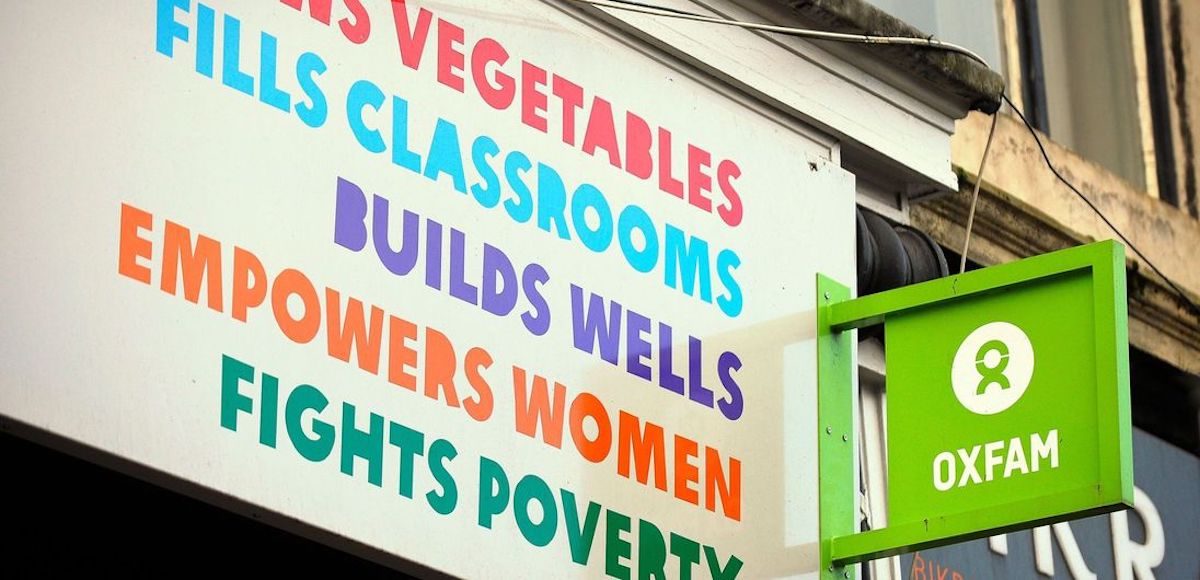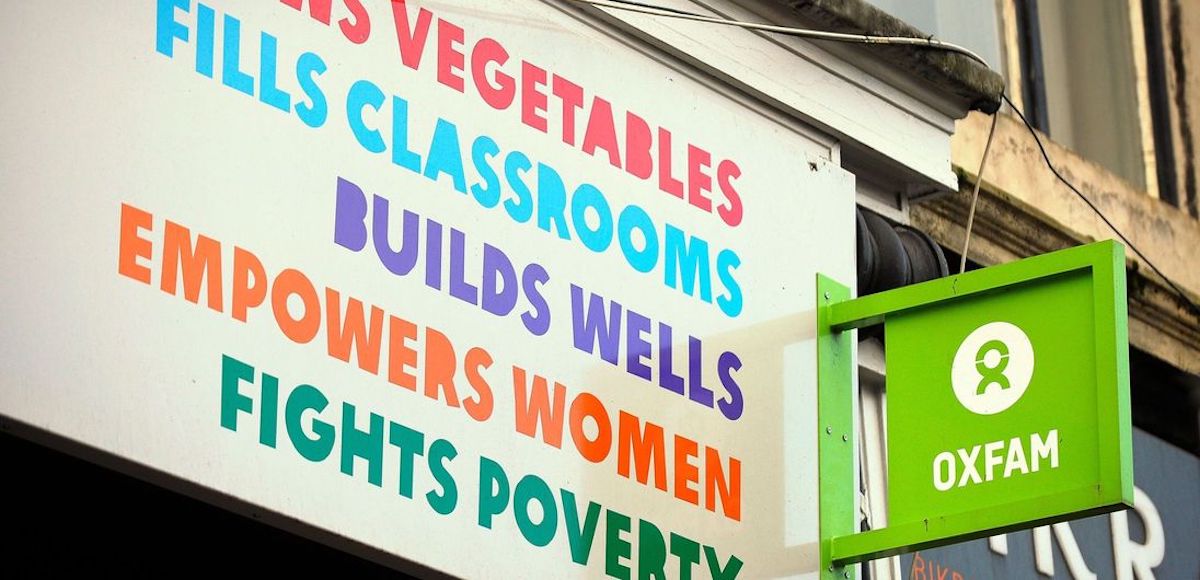

Oxfam was founded in 1942 at 17 Broad Street, Oxford, as the Oxford Committee for Famine Relief by a group of Quakers, social activists, and Oxford academics. (Photo: Reuters)
Writing a column every day is a recipe for making an occasional mistake. Sometimes the errors are minor, such as when I put Tucson in New Mexico rather than Arizona.
And sometimes they are less trivial, such as when I mischaracterized subsidies for the Postal Service or when I incorrectly criticized the Committee for a Responsible Federal Budget.
In an event, I always try to acknowledge and fix my mistakes.
And that’s why I want to write today about Oxfam. Early last year, I wrote a column criticizing the group’s statist orientation, asserting in my title that the group was a leftist joke instead of a real charity.
Time to correct the record. But I want to begin by noting that my title was only partly wrong. Oxfam is very much a left-wing organization. In prior columns, I’ve shared critiques of the group’s statist ideology from Tim Carney, Marian Tupy, and Tony Travers.
And before I get to the part about fixing my mistake, I want to augment this list by sharing the views of two more experts. We’ll start with some excerpts from a column in the Wall Street Journal by David Henderson.
Oxfam recently published a 76-page report, “Reward Work, Not Wealth,” that advocates taxing the rich to reduce inequality and help the poor. …There are two ways to close the gap. The first is to concentrate on making the poor better off. Mostly that has happened, thanks to liberalized international trade and reduced costs for shipping goods. Just as Walmart and Amazon have cut costs for Americans, the introduction of container shipping crushed transportation costs for the world. The second way to reduce inequality is to make the rich worse off.
Needless to say, Oxfam prefer the approach that gives more power and money to government.
Any guess which method Oxfam’s report emphasizes? “Governments should use regulation and taxation to radically reduce levels of extreme wealth,” the authors conclude. …The document’s title, “Reward Work, Not Wealth,” is strange: Wealth is one of the main rewards for productive work. High taxes on wealth and the wealthy reduce the incentive to produce.
And Oxfam, to its credit, understands that confiscatory taxes will require a global tax cartel.
…the report…effectively advocates…the creation of a tax cartel. Since capital is extremely mobile and will go where it is lightly taxed—witness the corporate “inversions” of American companies—the report suggests “a new generation of international tax reforms.” Negotiating tax rates would take place under the aegis of “a new global tax body that ensures all countries participate on an equal footing.”
Reading Henderson’s column, we have additional confirmation that Oxfam is a run-of-the-mill statist organization that myopically believes in class warfare.
So you might think the group is no different that other leftists groups such as the United Nations (UN) or the Organization for Economic Cooperation and Development (OECD). Or no different than politicians such as Barack Obama or Hillary Clinton.
But Oxfam also has a reputation for beclowning itself with shoddy analysis.
Johan Norberg mocked the group’s ideology-over-results approach when he noted that Oxfam is distressed about an era of “neoliberalism” in the world — meaning, in this case, the European definition of pro-market classical liberalism. Yet that’s also the period of time when the poor enjoyed huge gains.
For what it’s worth, I wrote a study 17 years ago debunking some of Oxfam’s sloppy work.
And here’s some of what Tim Worstall just wrote for the U.K.’s Adam Smith Institute.
Buried in Oxfam’s latest report about how disastrously unequal the world is we’ve got an assumption which is so breathtakingly foolish as to kill off any belief in the sense or sensibility of the organisation’s mindset. They’re trying to insist that the minimum wage in a place should be very much higher than GDP per capita in that same place.…the garment trade in Bangladesh…minimum wage there is…5,000 taka a month, or £50. …Yes, a low sum and most assuredly we’d all like it to be much higher. But Oxfam’s claim is that this should be a living wage of more like £250 a month (perhaps $250). Something which simply cannot happen. GDP per capita in Bangladesh is some $1,500 a year or so. We cannot have a minimum wage twice that. This would be the same claim as insisting that the UK minimum wage should be $80,000 a year (say, £60,000). …It’s a demand based upon the most aggressively stupid misunderstanding of what ails Bangladesh, isn’t it? ……to get this so wrong seriously calls into doubt Oxfam’s right to anything more than a contemptuous sneer. …Sorry folks, but Oxfam is deluded.
Tim concludes with some very wise words.
Bangladesh’s problem is not global inequality, the thing Oxfam is whining about, it’s Bangladesh’s poverty. …The cure for poverty is economic growth, the very thing which has reduced that global absolute poverty from 40% of all humans to under 10% in just these past three decades of that very neoliberal globalisation.
Now it’s finally time for my correction. When I wrote last year that Oxfam was “not a real charity,” I was merely implying that the group was a bad charity since it advocated policies that hurt poor people.
But thanks to new revelations about Oxfam’s involvement in horrific sex-crimes scandals, I’ve learned it doesn’t deserved to be called a charity of any kind. Check out these excerpts from a CNN report.
Oxfam’s deputy chief executive has resigned amid a growing sex crimes scandal involving the organization’s aid workers in Haiti and Chad. …Oxfam announced the resignation after a meeting with UK government officials Monday, at which it had fought to keep millions of pounds in public funding. …Oxfam received about £32 million (about $44 million) from the government last financial year, according to public records.
And the money from British taxpayers is just the tip of the iceberg.
Here’s a shocking bit of information from the conclusion of David Henderson’s column.
Oxfam’s annual budget exceeds $1 billion, and it gets almost half of that from governments and the United Nations. So maybe it’s time for a new name. Oxgov.
Almost half of its budget from taxpayers?!? At best, that makes them a government contractor rather than a charity.
I’ll conclude with two points.
- First, I think Oxfam should lose public funding. But not because some of its employees engaged in sexual predation. Yes, that’s bad, but I certainly don’t think sex abuse was ever part of the organization’s mission. Instead, it should lose funding because taxpayer money should not go to leftist organizations that advocate for bigger government (the same argument I use, by the way, when urging an end to OECD handouts).
- Second, instead of telling people that “Oxfam is a letist joke rather than a real charity,” I’ll have to changes the second part of the sentence. Maybe “Oxfam is a leftist joke and it mooches from taxpayers.” I’m not sure that rolls off the tongue gracefully, so I’m open to other suggestions.
P.S. You probably won’t be surprised to learn that the International Monetary Fund partners with Oxfam. I guess the old saying is right that birds of feather flock together.






